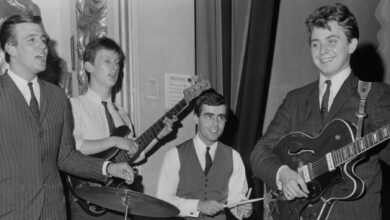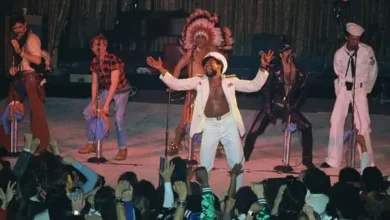Eric Clapton’s “Tears in Heaven” Transforms Grief into Global Healing in 1992
In 1992, Eric Clapton released a song so raw and personal that it transcended genre, language, and generation. “Tears in Heaven” was more than just a ballad—it was a quiet cry of the heart, a grieving father’s whispered question to the universe. The track struck an immediate chord with audiences around the world, rising to No. 2 on the Billboard Hot 100 in the United States and reaching the top ten in numerous countries. For an artist long revered for his guitar mastery, this vulnerable, stripped-back moment revealed a new side of Clapton—one that would leave a lasting mark on both his career and the world of music.
Born in 1945 in Surrey, England, Eric Clapton had already lived a lifetime in music by the time “Tears in Heaven” was released. From his early days with The Yardbirds and John Mayall’s Bluesbreakers to his legendary stints in Cream, Blind Faith, and Derek and the Dominos, Clapton had long been hailed as one of rock’s finest guitarists. Known as “Slowhand,” he had a signature sound steeped in blues tradition yet unmistakably his own. But for all his instrumental genius, Clapton had rarely opened a window into his deepest emotions—until tragedy changed everything.
The inspiration for “Tears in Heaven” came from an unthinkable loss. In March 1991, Clapton’s four-year-old son, Conor, died after falling from the 53rd floor of a New York City apartment. The grief was all-consuming. For months, Clapton withdrew from public life, using music as his only outlet. Alongside songwriter Will Jennings, he began crafting what would become one of the most heartbreaking and universally resonant songs in popular music history. Jennings later recalled how difficult the writing sessions were—how Clapton wept as he tried to give voice to a pain that defied explanation.
Recorded for the soundtrack of the film Rush, “Tears in Heaven” was not originally intended to be a hit. Clapton approached the recording with a sense of reverence and fragility. Produced by Russ Titelman, the track featured a gentle acoustic arrangement, with Clapton’s voice—fragile but focused—at the center. There were no soaring guitar solos, no studio gimmicks. Just a man, a few quiet chords, and the kind of sorrow that leaves a permanent mark on the soul.
The public response was immediate. Upon its release in January 1992, the song climbed the charts with speed, reaching No. 2 in the U.S. and topping charts in Canada, Norway, and Switzerland. It won three Grammy Awards that year: Record of the Year, Song of the Year, and Best Male Pop Vocal Performance. But more than awards, the song gave listeners something rare—permission to grieve. For many, “Tears in Heaven” became a way to process their own losses, their own questions about mortality and the afterlife.
Its cultural impact stretched beyond music. The song was used in memorials, funerals, and vigils across the globe. It was covered by artists in different languages, adapted for orchestras and choirs, and even included in mental health discussions about the healing power of music. For a generation coming of age in the 1990s, it became an emotional touchstone—a song that didn’t just play in the background, but demanded quiet reflection.
Clapton’s career also took a new turn. Though already a global icon, “Tears in Heaven” showed a more mature, introspective artist. It led to the release of Unplugged, a landmark live acoustic album that would become one of his most commercially successful records. The album’s softer tone, including a tender acoustic version of “Tears in Heaven,” broadened his audience and reintroduced Clapton to younger listeners discovering him for the first time.
The influence of “Tears in Heaven” on other artists was profound. Suddenly, emotional vulnerability became a legitimate path in rock and pop songwriting. It paved the way for more personal expressions in the mainstream, from Pearl Jam’s “Release” to Sheryl Crow’s “Home.” Even artists in other genres pointed to the song as a turning point—proof that intimate storytelling could connect on a mass scale.
Several notable covers have emerged over the years, including a moving version by Paul Anka and a rendition by Josh Groban that underscored the song’s spiritual undertones. Yet none have matched the emotional gravity of Clapton’s original. His performance wasn’t about technique—it was about honesty. And it’s that honesty that continues to move listeners decades later.
In the wake of Conor’s death, Clapton also became a quiet advocate for child safety and grieving parents. Though he rarely spoke about the tragedy in public, his actions—through charitable work and interviews—reflected a man forever changed. He eventually stopped performing the song live, stating that he wanted to leave that chapter behind. But the world has never forgotten it.
Today, “Tears in Heaven” remains a fixture in retrospectives of the 1990s and of Clapton’s career. It appears on countless lists of the most emotional songs ever written and continues to receive radio play around the world. Its staying power lies not in its production or melody, but in the universal truth it captures—that love, even in the face of unimaginable loss, endures.
The song also influenced how producers approached emotionally intimate recordings. The success of the Unplugged version inspired MTV and other platforms to explore stripped-down sessions with major artists, leading to a cultural shift in how live performance was captured and shared. It became proof that quiet could be powerful.
While Clapton has received countless honors in his career—including multiple inductions into the Rock and Roll Hall of Fame—“Tears in Heaven” may be his most enduring contribution to music. Not because it changed the charts, but because it changed people. It reminded us that even legends are human. That even gods of guitar grieve.
In the end, “Tears in Heaven” is not just about death. It’s about the unbreakable bond between a father and his son, the ache of absence, and the courage it takes to keep singing through the pain. Clapton gave us something more than a hit—he gave us a hymn for the brokenhearted.
And that’s why, all these years later, “Tears in Heaven” still lingers in the hearts of millions. It wasn’t a comeback. It wasn’t a career move. It was a moment of truth—and those never go out of tune.



